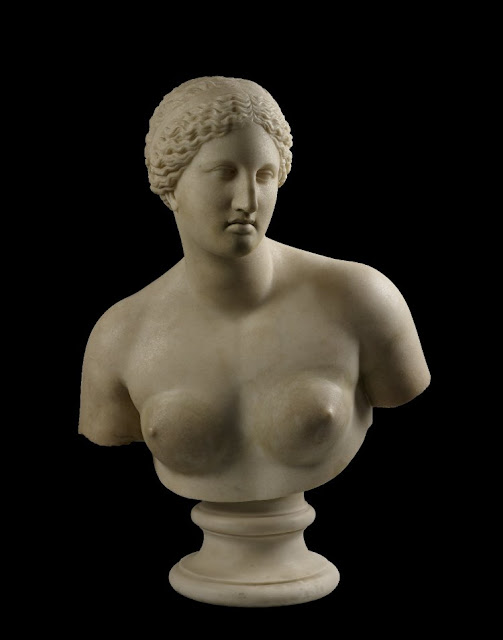 |
| Rome Head of Apollo 100 BC - AD 50 marble British Museum Hellenistic |
 |
| Rome Head of Apollo 100 BC - AD 50 marble British Museum Hellenistic |
 |
| Rome Head of Apollo 100 BC - AD 50 marble British Museum Hellenistic |
"Then Phoibos Apollo started to consider what men he should bring in as ministers to serve him at rocky Pytho. While he was pondering this, he noticed a swift ship on the wine-faced sea, and in it were many fine men. Cretans from Cnossos the city of Minos, the ones who perform sacrifices for the god, and who announce the rulings of Phoibos Apollo of the golden sword, whatever he says when he gives his oracles from the bay tree down in the glens of Parnassus. They were sailing on business in their dark ship towards sandy Pylos and Pylos' folk. But he, Phoibos Apollo, intercepted them, and out at sea leaped onto the swift ship in the likeness of a dolphin, and lay there, a huge and fearsome beast. If any of them took it in mind to touch him, he would toss him off in any direction, shaking the ship's timbers. So they sat quiet in the ship in terror; they did not slacken the sheets along the hollow ship, or slacken the sail of the dark-prowed craft, but as they had originally rigged it, so they sailed on, with a brisk southerly speeding the vessel from astern . . . They wanted to halt the ship there and disembark to consider the wondrous creature, and see whether the beast would stay on the deck of the hollow ship or plunge off into the salt swell that teems with fish. But the well-built craft would not obey the rudder, but continued to hold its course past rich Peloponnese; the far-shooting lord Apollo was steering it effortlessly with his breath. . . . So then they sailed and they came to Crisa with its sunny vine slopes, into the harbor, and the seagoing ship grounded on the sands. There the far-shooting lord Apollo darted off the ship, looking like a star in broad daylight, with countless sparks flying off him, and the brilliance was heaven-high. He disappeared into the sanctum through the precious tripods, and there he lit a flame to manifest his divine force. The whole of Crisa was filled with the radiance, and the Crisaeans' wives and fair-girt daughters yelled aloud under Phoibos' impulse, for he had put terror into everyone. From there again he flew back to the ship, fast as thought, in the likeness of a sturdy yeoman in his first prime, his hair falling over his broad shoulders, and he addressed them in winged words – Sirs, who dwelt in wooded Cnossos before, now you will return no more to your lovely city and your fine individual homes and your dear wives: you will occupy my rich temple here, which is widely honored by men. For I am Zeus' son, I declare myself Apollo: and I brought you here over the mighty main not with any ill intent, but you are to occupy my rich temple here, which is greatly honored by all men, and you shall know the gods' intentions. By their will you shall be held in honor for all time."
– from the Hymn to Apollo translated by Martin L. West in the Loeb Classical Library volume, Homeric Hymns (Harvard University Press, 2003)
 |
| Rome Bust of Antinous AD 130-140 marble British Museum Townley Collection |
 |
| Rome Bust of Antinous AD 130-140 marble British Museum Townley Collection |
 |
| Rome Head of a woman 50-30 BC limestone British Museum Cleopatra-type |
 |
| Rome Bust of Demosthenes 100 BC - AD 50 marble British Museum after model of Polyeuktos |
 |
| Rome Head of Aphrodite AD 100 marble British Museum after model of Pheidias |
 |
| Rome Bust of Augustus 1st century AD marble British Museum |
 |
| Rome Bust of Augustus 1st century AD marble British Museum |
 |
| Rome Bust of Aphrodite of Knidos 1st-2nd century AD marble British Museum after model of Praxiteles |
 |
| Rome Bust of Faustina the Elder 2nd century AD marble British Museum |
 |
| Rome Portrait-head of a woman AD 105-115 marble British Museum |
 |
| Rome Colossal Bust of Zeus AD 130-150 marble British Museum excavated at Hadrian's Villa |
"Of Zeus, best and greatest of the gods, I will sing the wide-sounding ruler, the one that brings to fulfillment, who consults closely with Themis as she sits leaning against him. Be favorable, wide-sounding son of Kronos, greatest and most glorious."